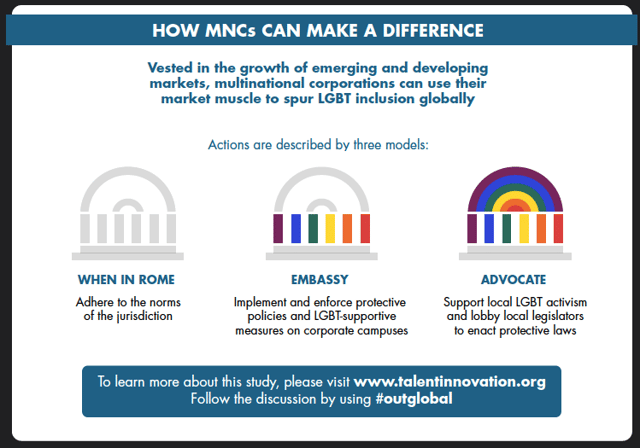
Today, internationally travelling business executives and their companies are at a crossroads. What does one do when pro-LGBT policies and protections don’t extend beyond a company’s walls?
Not every country sees the benefits of promoting inclusivity within a company and outside of it— even though they are abundant and growing. One study by the Center for Talent Innovation1 shed light on the advantages:
- A pro-LGBT stance improves a company’s ability to attract talent and consumers – within and outside the LGBT community
- 72% of respondents who self-identify as LGBT allies say they are more likely to accept a job at a company that supports equal opportunities for LGBT employees.
- 82% percent of all respondents and 71 percent of LGBT individuals say they are more likely to purchase a good or service from a company that supports LGBT equality.
- LGBT employee engagement is higher, too: 84 percent of LGBT employees at supportive companies say they are proud to work for their employer.
Add cultural training to internationally mobile executives and even greater gains can be made.
This is how business executives and travelers can get an edge in the global marketplace where each country and company has a unique position on LGBT-rights.
“Ensuring that business travelers and expatriates have location-based cultural content will only result in better business outcomes across borders,” says Michael Grover, consultant in Mercer’s Career business, specializing in global mobility. “With so much attention on diversity and human rights issues, we need insights, advice and current information for dealing with a diverse workforce, including the LGBT community, is a necessity.”
The CulturalTrainingPassport™ from CultureWizard is one vital source for the mobile executive. The portal looks at LGBT-specific cultural norms from over 100 countries, offering tips to executives to extend protection to talent beyond their company walls. It can help multinational companies and its diverse staff navigate and even thrive in both pro- and anti-LGBT jurisdictions.
For example, the CulturalTrainingPassport platform informs LGBT business executives traveling to Iceland that the country is one of the most progressive with legalized same-sex marriage laws enacted in 2010 and prohibitions on hate speech in place since 1996. It also conveys that homosexuality is a punishable offense in Saudi Arabia and that members of the LGBT community in Turkey have faced discrimination and harassment, and therefore, are advised to keep relationships discreet in public.
By understanding the nuances of each country’s cultural and governmental policies, mobile business executives can be informed, comfortable and confident doing business globally. A study from the Center of Talent Innovation and the Human Rights Campaign Foundation offered three ways. See infographic below:

According to Mercer’s North America LGBT Pulse Mobility Survey, however, almost two-thirds (61%) of organizations are not aware of the local and cultural environment or legal conditions for LGBT employees in all the locations in which they operate. Moreover, 73% of the cultural training offered to internationally mobile employees does not include information regarding LGBT considerations. Thus, given the expansion and acceptance of LGBT rights around the world and organizations’ interests in being progressive as well as non-discriminatory, the information the CulturalTrainingPassport provides is essential.
Mercer and RW3 CultureWizard helping LGBT business executives make informed decisions when conducting business across cultures.
CulturalTrainingPassport™ now features country-specific cultural insights and content relevant to LGBT employees. Country-by-country information that sheds light on attitudes towards the LGBT community for more than 100 countries around the world.
---------
1. The Center for Talent Innovation. “Study Maps Challenges and Opportunities for Pro-LGBT Companies Operatingin Anti-LGBT Markets”

